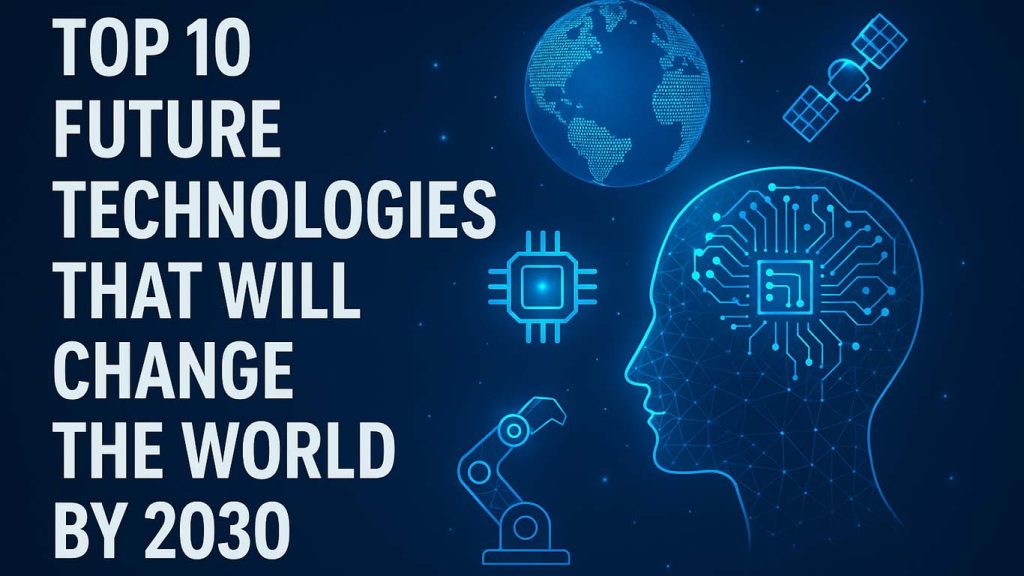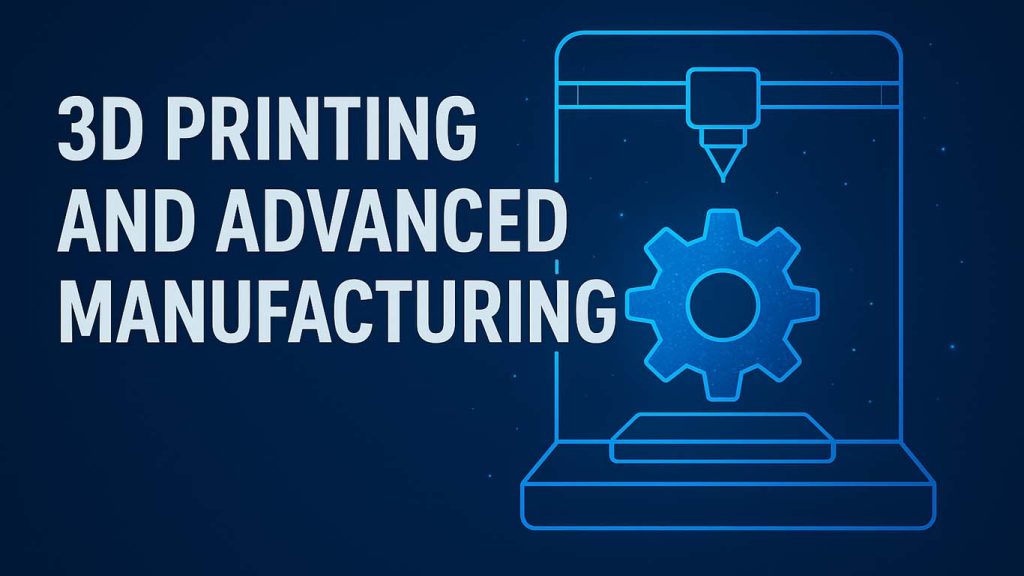Top 10 Future Technology That Will Change the World by 2030
In today’s rapidly evolving digital age, future technology is shaping industries, economies, and even the way we live our everyday lives. From artificial intelligence to renewable energy, the next decade promises a wave of next-gen tech that could transform society in ways we are only beginning to imagine. Experts predict that by 2030, several key tech trends 2030 will not only redefine businesses but also revolutionize healthcare, communication, energy, and human lifestyle.
In this blog post, we will explore the Top 10 Future Technologies That Will Change the World by 2030. Each section will break down how these innovations work, their potential impact, and why they matter. Whether you are an entrepreneur, a student, or simply curious about innovation, this article will give you a roadmap of what lies ahead.

1. Artificial Intelligence and Machine Learning 2.0
Artificial Intelligence (AI) has already made a massive impact, but by 2030, it will enter a new era—AI 2.0. Unlike today’s models, which rely heavily on human data and training, the next generation of AI will be capable of autonomous learning.
Key Advancements Expected by 2030:
- Self-improving algorithms that require little to no human intervention.
- AI-powered healthcare that can diagnose and even treat patients remotely.
- Personalized AI assistants that manage everything from financial planning to mental health support.
- Integration of AI ethics to ensure transparency and responsible use.
Why It Matters:
AI 2.0 will fundamentally transform industries like education, medicine, finance, and transport. Imagine hospitals where AI systems predict disease outbreaks before they spread, or schools where every child receives a personalized learning plan optimized by AI.
This is not just an innovation—it’s a revolution that will reshape human potential.
2. Quantum Computing
Quantum computing has been a buzzword for years, but by 2030, it is expected to move from laboratories into mainstream industries. Unlike classical computers that rely on binary systems (0s and 1s), quantum computers leverage qubits—capable of existing in multiple states at once.
Key Applications:
- Drug Discovery: Pharmaceutical companies can design medicines faster by simulating molecular structures at the quantum level.
- Cryptography: Quantum encryption will make data virtually unhackable, ensuring cybersecurity in a digital-first world.
- Financial Modeling: Banks and investment firms will use quantum systems for real-time risk analysis.
- Climate Research: More accurate models to predict climate change and natural disasters.
Why It Matters:
Quantum computing could reduce the time for complex calculations from years to seconds. By 2030, it could unlock solutions to challenges that are currently unsolvable. This next-gen tech will become the backbone of industries dependent on big data and simulations.
3. Brain-Computer Interfaces (BCIs)
Imagine controlling a computer, smartphone, or even a robotic arm with just your thoughts. This is the promise of Brain-Computer Interfaces (BCIs). By 2030, BCIs could redefine the way humans interact with machines.
Real-World Possibilities:
- Medical Use: Helping paralyzed patients regain control over mobility through thought-driven prosthetics.
- Education & Learning: Direct knowledge transfer from computers to the brain.
- Entertainment: Immersive virtual reality powered by brain signals.
- Workplace Productivity: Hands-free communication and faster decision-making.
Why It Matters:
BCIs could blur the boundaries between humans and technology, leading to an era where future technology doesn’t just assist us but becomes an extension of our minds. Ethical and privacy concerns will be critical, but the potential is limitless.
4. Renewable Energy and Fusion Power
Climate change is one of the biggest challenges of our time. By 2030, energy will be at the heart of the innovation movement. The transition to renewable energy sources like solar, wind, and hydropower will accelerate. But the real game-changer could be fusion power—the process that powers the sun.
Key Developments Expected:
- Large-scale fusion reactors producing clean, limitless energy.
- Breakthroughs in battery storage for renewable energy.
- Smart grids integrating solar panels and electric vehicles seamlessly.
- Decentralized energy systems where households become energy producers.
Why It Matters:
The world currently depends on fossil fuels, but tech trends 2030 show a shift toward sustainable alternatives. Fusion power, if achieved, could provide abundant, carbon-free energy, eliminating the global energy crisis.
5. Autonomous Vehicles and Hyperloop
Transportation will undergo a massive transformation by 2030. While self-driving cars are already being tested, autonomous vehicles (AVs) will become mainstream. Alongside them, futuristic projects like Elon Musk’s Hyperloop may reshape urban commuting.
Expected Transformations:
- Self-driving taxis and trucks reducing accidents and congestion.
- Flying cars or vertical take-off vehicles in urban areas.
- High-speed Hyperloop systems connecting cities in minutes instead of hours.
- AI-powered traffic management reducing pollution and fuel waste.
Why It Matters:
Transportation impacts every sector of the economy. By 2030, AVs and Hyperloop could not only improve efficiency but also drastically cut greenhouse gas emissions. This future technology will redefine global mobility.
6. Biotechnology and Genetic Engineering
By 2030, biotechnology will push the boundaries of human health and agriculture. Scientists are already experimenting with CRISPR gene-editing technology, and its applications could expand dramatically.
Key Applications:
- Personalized Medicine: Tailored treatments based on an individual’s genetic makeup.
- Disease Eradication: Potential cures for genetic diseases like cystic fibrosis or Huntington’s disease.
- Agricultural Innovation: Climate-resistant crops to ensure food security.
- Human Longevity: Research into extending human lifespan.
Why It Matters:
This next-gen tech holds the power to eliminate diseases and improve quality of life for billions. However, it also raises ethical questions about human enhancement and genetic modification.
7. Space Exploration and Colonization
Space is no longer just the domain of governments; private companies like SpaceX, Blue Origin, and others are leading the charge. By 2030, we could see permanent human presence on the Moon or even Mars.
Key Milestones by 2030:
- First human missions to Mars.
- Moon bases for research and mining rare minerals.
- Space tourism becoming commercially viable.
- Satellite networks providing internet access to remote areas.
Why It Matters:
Space exploration is more than adventure—it’s about survival. With Earth facing environmental challenges, exploring space offers humanity new resources and opportunities for colonization. This innovation could mark the next chapter in human civilization.
8. Internet of Everything (IoE)
The Internet of Things (IoT) is already connecting smart devices, but by 2030, the Internet of Everything (IoE) will emerge. This goes beyond objects, linking people, data, processes, and devices into a single intelligent network.
Applications by 2030:
- Smart Cities: Fully automated traffic systems, energy-efficient buildings, and connected healthcare.
- Industrial IoE: Factories running on real-time data to optimize production.
- Home Automation: Entire homes responding to human emotions and needs.
- Global Connectivity: Billions of devices communicating seamlessly.
Why It Matters:
IoE will make our environment more responsive and efficient. By combining AI and big data, the world will be more connected than ever before, leading to smarter decisions and better living standards.
9. 3D Printing and Advanced Manufacturing

3D printing has already disrupted industries, but by 2030, it could become as common as smartphones. From manufacturing to healthcare, future technology in 3D printing will scale up massively.
Key Use Cases:
- Healthcare: Printing organs, tissues, and customized prosthetics.
- Construction: 3D-printed houses completed in days, not months.
- Food Industry: Printing personalized meals with exact nutritional value.
- Aerospace & Defense: Lightweight, strong parts for rockets and aircraft.
Why It Matters:
3D printing reduces waste, cuts costs, and allows for innovation on demand. This next-gen tech will democratize manufacturing, enabling small businesses and individuals to compete with large corporations.
10. Augmented Reality (AR) and Virtual Reality (VR)
By 2030, AR and VR will go far beyond gaming. These immersive technologies will merge the digital and physical worlds seamlessly.
Future Possibilities:
- Education: Virtual classrooms where students interact with 3D objects.
- Healthcare: Surgeons using AR for real-time guidance.
- Retail: Customers trying products virtually before purchase.
- Tourism: Exploring destinations from home through VR experiences.
Why It Matters:
AR and VR will redefine human interaction and reshape industries such as travel, retail, and education. Combined with BCIs, they could provide experiences that feel as real as the physical world.
Final Thoughts
By 2030, these tech trends 2030 will revolutionize the way we live, work, and connect. From AI 2.0 to fusion energy and space colonization, the future will be shaped by breakthroughs that once belonged only to science fiction.
While these future technologies promise immense benefits, they also bring challenges—ethical dilemmas, job disruptions, and security risks. To harness their full potential, global cooperation, ethical frameworks, and inclusive policies will be essential.
As we move forward, one thing is clear: innovation will remain the heartbeat of progress. The world of 2030 will look drastically different, and these top 10 technologies will be at the center of that transformation.
